 |
 |
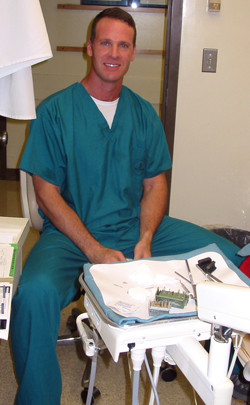
|
|
James Tynecki, D.D.S., Dentist, United States Navy Dental Officer, National Naval Medical Center, Bethesda, Maryland
|
1. I chose this career because...
2. My typical workday involves...
3. What I like best/least about my work...
4. My career goals are...
5. When I'm not working, I like to...
6. Choose... seek... help!
|
|
1. I chose this career because...
|
Back to Top

|
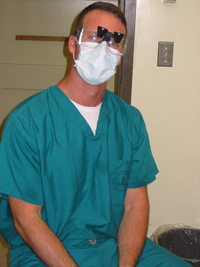
|
|
James Tynecki wears protective eye gear with magnifying glasses when working with patients.
|
I chose to become a dentist because it allows me to be self-employed, work independently, use my artistic ability, and express my creativity. Achieving gratification through helping others is most important to me.
Inspiration: the Family Dentist and Art
When I was growing up in New York State, my family dentist was one of the nicest and funniest people that I knew. He always greeted me with a smile and a great handshake. He made me very comfortable and at ease in his office. He would encourage me to come and watch him at work. During this time, I also loved art classes and would draw whenever I had free time at home. As a dentist, this ability has allowed me to conceptualize the finished product before I begin the task of reconstruction.
Diverse Job History
During the years of my education, I held a number of different jobs while continuing my search for a career that made me happy. I was a church janitor, swimming pool installer, grocery bagger, UPS truck loader, shoe salesman at Nordstrom, waiter at the Hard Rock Café in Washington DC, and finally, head waiter at Fleetwood’s restaurant in Old Town Alexandria. I finally decided to pursue dentistry and was accepted at Howard University College of Dentistry in Washington, DC.
Education
- Associate of Arts, Dietetics and Nutrition, Florida International University, Miami, Florida
- Doctor of Dental Surgery (D.D.S.), Howard University College of Dentistry, Washington, DC
- Licensed to practice in Pennsylvania
- Member: Academy of General Dentistry
Continuing Education
Currently, I am working to fulfill the requirements of a Fellowship from the Academy of General Dentistry (http://www.agd.org/). Requirements include:
- Retaining membership in the Academy for 3 years
- Completing 400 hours of continuing education credits (I have completed 500 hours.)
- Passing a 400-question exam. (I expect to take this exam in the coming months at one of the many testing centers in the US.)
|
|
2. My typical workday involves...
|
Back to Top

|
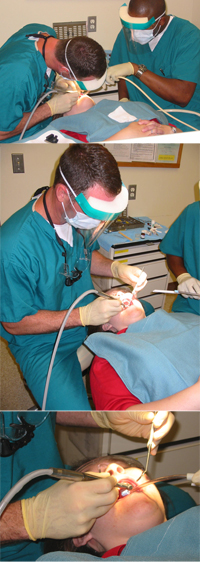
|
|
James Tynecki and an assistant prepare a patient to recieve 9 crowns.
|
My typical workday usually starts around 7:00 a.m. and ends at 4:00 p.m., with an hour lunch break around midday. Patients are generally scheduled every hour.
A dental appointment involves:
- Reviewing the patient’s history to determine the chief complaint
- Checking the patient’s general health and vital signs
- Requesting that the dental assistant prepare the necessary materials for the dental procedure
- Dental Procedures such as:
- Periodontal Surgery
- Wisdom tooth extraction
- Fitting crowns/dental bridges
- Implants
- Esthetic Dentistry: white fillings and porcelain veneers
- Fillings/Root canals
Being a junior dental officer means there are always senior officers available for consultation. I have always taken advantage of these educational assets. There is no better resource than experience. At most dental commands, there are specialists to consult with and learn from, in every field of dentistry.
Administrative Responsibilities
Paperwork is a very important aspect of dentistry. Documentation of everything you and the patient say and do is very important to protecting both yourself and your patient. In the military, there are a number of written documents that are required besides writing-up patient care. There are monthly time sheets used to account for the clinical and non-clinical work, and also written records of the amount of work that was accomplished.
Duties of a Naval Officer
First and foremost, I am a Naval Officer but my occupation is practicing dentistry. I have had many other collateral duties aside from treating patients such as:
- Running the command library
- Controlling precious metals
- Serving on the code blue or emergency response team
- Managing enlisted and civilian subordinates
- Controlling infection
- Training - enlisted advancement
- Preparing weekly and monthly situation reports
- Continuing education
- Writing periodic evaluation reports for subordinates
- Counseling enlisted personnel
- General military training for all staff
|
|
3. What I like best/least about my work...
|
Back to Top

|
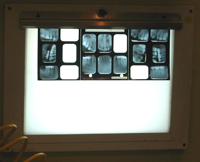
|
|
X-rays such as the one shown give Dr.Tynecki a better view of the patient's mouth and aid in diagnosis and treatment decisions.
|
What I like best about my work is when I give a patient a “smile” that they are proud to wear. In some cases, a patient’s appearance affects their ability to interact successfully with others. Many patients won’t smile because they believe they have an unattractive smile. Often one or two appointments may correct the problem. Other times, it may take months to make a difference. My artistic and creative abilities have really helped me as a dentist. Being good with your hands and being compassionate are also necessary skills in good dental practice.
The most difficult, yet satisfying part of my job is planning the overall treatment of a patient. A dentist needs to look at the whole person, not just their teeth. A dentist is generally the first one to identify systemic diseases, because many diseases present their first signs and symptoms in the head and neck region. The detection of a possible systemic disease places a great responsibility on the dentist, and emphasizes the importance of staying current in the knowledge of good dental practice.
The treatment planning process is very time consuming and requires thinking in many different directions at one time. There is not always one treatment option for one problem. A dentist must think of different options, not only the most complex and expensive, but also the ones that will best suit the patient’s income, function and longevity.
What I like least about my work is when patients walk away with beautiful new teeth, but do not understand the importance of good oral hygiene practices necessary to maintain their new healthy teeth. The military dental care is free, and patients often do not appreciate the amount of time and effort that goes into their care.
|
|
4. My career goals are...
|
Back to Top

|
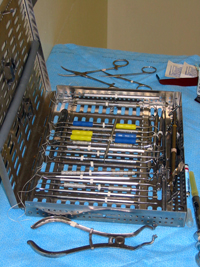
|
|
The metal case shown above is tolerant of the high heat that is used for sterilization of dental instruments.
|
My career goals are to acquire dental specialty training (which I am in the process of now), attain my Masters degree, and conduct research. My long-term goals are to become an expert in my profession and work for at least 20 years until I can retire from the US Navy. I would also enjoy educating others in either an academic institution or in the Military services.
I am not sure where I see myself in 5-10 years since the field of dentistry is constantly progressing and changing. I know that it is very important to stay current with advancements, so my vision for the future will most likely change as the times change.
|
|
5. When I'm not working, I like to...
|
Back to Top

|
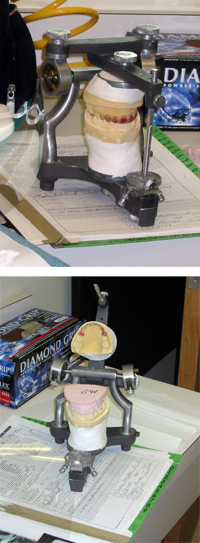
|
|
An articulator with a dental impression before treatment (above) and the new denture made from the impression (below)
|
When I’m not working, I like to spend as much time outdoors as possible, weather permitting. I play tournament paintball, race mountain bikes, run, hike, play with my dogs and go horseback riding. As the military provides 30 days of annual paid vacation, I take many opportunities to travel whether it is out of the country or camping in the mountains a few hours from home.
|
|
6. Choose... seek... help!
|
Back to Top

|
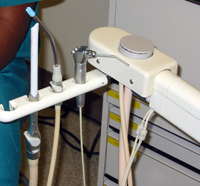
|
|
| |
Large and small suction tubes and an irrigator are typical instruments used for routine check-ups.
|
Choose something that you will look forward to doing for many years. Be performance motivated, not financially driven. Talk to everyone you meet and ask questions about their jobs, quality of life, time spent with their family, and always ask for advice. Make the most of what you do whether it is at work or play. Reach out and help people, ultimately, this will make a difference in their lives and yours.
|
|
|
|
 |